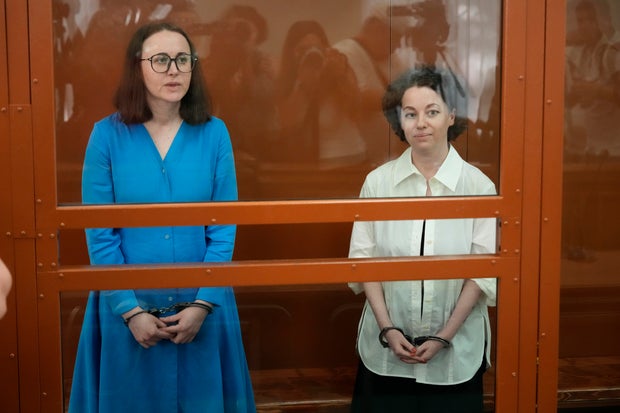CBS News
Does Medicare cover long-term care costs?

Getty Images
The American population continues to age, and, in turn, the demand and costs for long-term care services are skyrocketing. According to LongTermCare.gov, someone turning 65 today has almost a 70% chance of needing some type of long-term care in their remaining years, and that care comes with a hefty price tag today.
For example, if you need nursing home services, the average cost for a semi-private room in a nursing home is over $104,000 per year. The price for a private room in a nursing home is even higher, with an average price tag of over $117,000 annually. And, even less intensive care, like, homemaker services, can come at a high cost, with this option currently clocking in at over $63,000 per year today. With costs like these, it’s no surprise that many seniors are concerned about the affordability of long-term care costs.
That said, many seniors or their family members may be counting on Medicare to help cover the cost of long-term care when the need arises. The reality is, though, that Medicare’s coverage can be limited — especially when it comes to long-term care. So, understanding exactly what is and isn’t covered is crucial for proper planning and ensuring you can afford the care you need as you age.
Find out how the right long-term care insurance policy could help you today.
Does Medicare cover long-term care costs?
Medicare generally does not cover the costs of long-term care services that assist with activities of daily living over an extended period of time. This includes the costs of non-medical care for things like bathing, dressing, eating, getting in and out of bed and using the bathroom.
Under original Medicare Part A (hospital insurance) and Part B (medical insurance), you’ll typically pay 100% out-of-pocket for most long-term care services that are considered custodial rather than skilled medical care. Medicare supplemental insurance policies generally (Medigap plans) also generally provide no coverage for long-term care.
According to Medicare.gov, there are only a few limited circumstances where Medicare may temporarily cover some types of long-term care costs, such as:
- Up to 100 days of skilled nursing home care per illness through Part A, but only after a qualifying 3-day inpatient hospital stay, and only for continued skilled medical care rather than custodial care
- Limited coverage through Part A for hospice care for terminally ill patients
- Some coverage through Part B for specific home health care services like intermittent skilled nursing care, physical therapy and occupational therapy, as long as it is considered medically necessary
So while traditional Medicare plans help cover medical costs for things like doctor visits, preventative care, hospital stays, lab tests and surgeries, they generally leave a major gap when it comes to long-term custodial care. As a result, many seniors exhaust their personal savings and assets paying out-of-pocket for long-term care before eventually qualifying for Medicaid to foot the bill.
Explore your top long-term care insurance options online now.
Other options for covering the costs of long-term care
Since Medicare provides little to no coverage for ongoing long-term care, most seniors need to make other arrangements. Other options to consider include:
Long-term care insurance
Long-term care insurance policies are often a smart option to consider because they help cover the costs of nursing homes, assisted living facilities, in-home care and other long-term care services. The premiums for these policies are based on age, health status and amount of coverage selected.
If you want to take advantage of what long-term care insurance offers, though, it’s best to apply for coverage when relatively young and healthy to get lower rates. After all, premiums can increase over time and getting your application approved can be more difficult as you age and face more health issues.
Medicaid (if you qualify)
Medicaid, a joint federal-state program, may help pay for certain health services for those with limited income and assets. There are strict requirements to qualify, but once qualifiable financial criteria are met, Medicaid can cover nursing home care and some home and community-based long-term care services. However, you may have to “spend down” your assets paying for care before qualifying.
A life insurance policy
Some whole life insurance policies allow you to receive a portion of the death benefit early as an accelerated benefit, which can be used to cover long-term care costs. Other hybrid products combine a life insurance benefit with a long-term care rider. Both of these options let you access funds for care while still leaving some death benefits to your heirs.
Personal savings and income
Self-funding long-term care from retirement accounts, social security, home equity or other types of funds can work if you have substantial assets. However, paying out-of-pocket at $100,000 or more each year for things like nursing home care can quickly deplete the savings you intended for other expenses and legacies.
A reverse mortgage
For homeowners age 62 and older, reverse mortgages allow you to access a portion of your home’s equity to cover long-term care and other retirement expenses without having to make monthly mortgage payments. However, the loan balance grows over time and the loan ultimately has to be repaid to the lender when you move out of the home or die.
A health savings account
If you’re enrolled in an eligible high-deductible health plan, you can contribute pre-tax dollars to a health savings account (HSA). Money contributed to an HSA is not taxed, grows tax-deferred and can be withdrawn tax-free to pay for qualified long-term care premiums and out-of-pocket expenses.
The bottom line
With long-term care costs continuing their upward trajectory, being prepared is essential to maintain your independence and ensure access to quality care as you age. Since Medicare leaves such a large gap, considering options like long-term care insurance, Medicaid eligibility planning or hybrid insurance products can provide crucial protection and peace of mind. Just make sure you fully understand what you’re getting into before choosing a route so you can make the most informed decision for your unique needs.
CBS News
Russian playwright, theater director sentenced to prison on terrorism charges

A Russian court on Monday convicted a theater director and a playwright of terrorism charges and sentenced them to six years each in prison, the latest in an unrelenting crackdown on dissent across the country that has reached new heights since Moscow sent troops into Ukraine.
Zhenya Berkovich, a prominent independent theater director, and playwright Svetlana Petriychuk have already been in jail for over a year awaiting trial.
Authorities claimed their play “Finist, the Brave Falcon” justifies terrorism, which is a criminal offense in Russia punishable by up to seven years in prison. Berkovich and Petriychuk have both repeatedly rejected the accusations against them.
In one hearing, Berkovich told the court that she staged the play in order to prevent terrorism, and Petriychuk echoed her sentiment, saying that she wrote it in order to prevent events like those depicted in the play.
The women’s lawyers pointed out at court hearings before the trial that the play was supported by the Russian Culture Ministry and won the Golden Mask award, Russia’s most prestigious national theater award. In 2019, the play was read to inmates of a women’s prison in Siberia, and Russia’s state penitentiary service praised it on its website, Petriychuk’s lawyer said.
Alexander Zemlianichenko / AP
The case against Berkovich and Petriychuk elicited outrage in Russia. An open letter in support of the two artists, started by the independent Novaya Gazeta newspaper, was signed by more than 16,000 people since their arrest.
The play, the letter argued, “carries an absolutely clear anti-terrorist sentiment.”
Dozens of Russian actors, directors and journalists also signed affidavits urging the court to release the two from custody pending investigation and trial.
Immediately after Russia launched its full-scale invasion of Ukraine, the Kremlin unleashed a sweeping campaign of repression, unparalleled since the Soviet era. It has effectively criminalized any criticism of the war, with the authorities targeting not only prominent opposition figures who eventually received draconian prison terms, but anyone who spoke out against it, publicly or otherwise.
Pressure mounted on critical artists in Russia, too. Actors and directors were fired from state-run theaters, and musicians were blacklisted from performing in the country. Some were slapped with the label “foreign agent,” which carries additional government scrutiny and strong negative connotations. Many have left Russia.
Berkovich, who is raising two adopted daughters, refused to leave Russia and continued working with her independent theater production in Moscow, called Soso’s Daughters. Shortly after the start of the war in Ukraine, she staged an anti-war picket and was jailed for 11 days.
CBS News
Which lawmakers are calling for Biden to drop out of 2024 race?

Watch CBS News
Be the first to know
Get browser notifications for breaking news, live events, and exclusive reporting.
CBS News
More Americans say college just isn’t worth it, survey finds

Americans are increasingly skeptical about the value and cost of college, with most saying they feel the U.S. higher education system is headed in the “wrong direction,” according to a new poll.
Overall, only 36% of adults say they have a “great deal” or “quite a lot” of confidence in higher education, according to the report released Monday by Gallup and the Lumina Foundation. That confidence level has declined steadily from 57% in 2015.
Some of the same opinions have been reflected in declining enrollment as colleges contend with the effects of the student debt crisis, concerns about the high cost of tuition and political debates over how they teach about race and other topics.
Whether a college educations is required to achieve professional success is also up for debate, as only about 1 in 4 Americans say a bachelor’s degree is necessary to secure a well-paying job, according to a March survey from the Pew Research Center.
Employment opportunities and earnings for young men without college degrees have improved in the last decade, reversing some of the economic damage that eroded the group’s fortunes starting in the 1970s. Young men with only a high school degree have seen a slight rebound in their earnings since 2014, Pew found.
The median annual income for men 25- to 34-years-old without a college degree was $45,000 in 2023, a 15% increase from $39,300 in 2014 when adjusted for inflation, according to Pew’s analysis of Census data.
Dimming belief in college
But the dimming view of whether college is worth the time and money extends across all demographics, including gender, age and political affiliation. Among Republicans, the number of respondents with high confidence in higher education has dropped 36 percentage points over the last decade — far more than it dropped for Democrats or independents.
“It’s so expensive, and I don’t think colleges are teaching people what they need to get a job,” said Randy Hill, 59, a registered Republican in Connecticut and a driver for a car service. His nephew plans to do a welding apprenticeship after graduating high school. “You graduate out of college, you’re up to eyeballs in debt, you can’t get a job, then you can’t pay it off. What’s the point?”
The Gallup-Lumina survey’s overall finding — that 36% of adults have strong confidence in higher education — is unchanged from the year before. But what concerns researchers is shifting opinion on the bottom end, with fewer Americans saying they have “some” confidence and more reporting “very little” and “none.” This year’s findings show almost as many people have little or no confidence, 32%, as those with high confidence.
Tuition too high
“The No. 1 deterrent for a student not to pursue a college degree is affordability — they simply think they can’t afford the cost of a higher education,” Michael Itzkowitz, founder of HEA Group, a research and consulting firm focused on college, told CBS MoneyWatch in May.
The schools with the best return on investment for low- and middle-income students include many of California’s state colleges, which tend to be lower-priced than nonprofit private universities, he noted.
Experts say that fewer college graduates could worsen labor shortages in fields from health care to information technology. For those who forgo college, it often means lower lifetime earnings — 75% less compared with those who get bachelor’s degrees, according to Georgetown University’s Center on Education and the Workforce. And during an economic downturn, those without degrees are more likely to lose jobs.
“It is sad to see that confidence hasn’t grown at all,” said Courtney Brown, vice president at Lumina, an education nonprofit focused on increasing the numbers of students who seek education beyond high school. “What’s shocking to me is that the people who have low or no confidence is actually increasing.”
This year’s survey added new, detailed questions in an effort to understand why confidence is shrinking.
Almost one-third of respondents say college is “too expensive,” while 24% feel students are not being properly educated or taught what they need to succeed.
The survey did not specifically touch on the protests this year against the war in Gaza that divided many college campuses, but political views weighed heavily on the findings. Respondents voiced concerns about indoctrination, political bias and that colleges today are too liberal. Among the respondents who lack confidence, 41% cite political agendas as a reason.
Generally when people express confidence in higher education, they are thinking of four-year institutions, according to Gallup. But the survey found that more people have confidence in two-year institutions. Forty-nine percent of adults say they have “a great deal” or “quite a lot” of confidence in two-year programs, compared with 33% of Americans who feel that way about four-year colleges.
California college student Kristen Freeman understands why.
“It’s about saving money. That’s why I went to a two-year. It’s more bang for your buck,” said Freeman, 22, a sociology major at Diablo Valley Community College with plans to transfer to San Jose State University for the final two years of college.
Freeman understands the concerns about indoctrination and whether college prepares students for life and work but also feels the only way to change structural problems is from the inside. “I am learning about the world around me and developing useful skills in critical thinking,” Freeman said. “I think higher education can give students the spark to want to change the system.”



